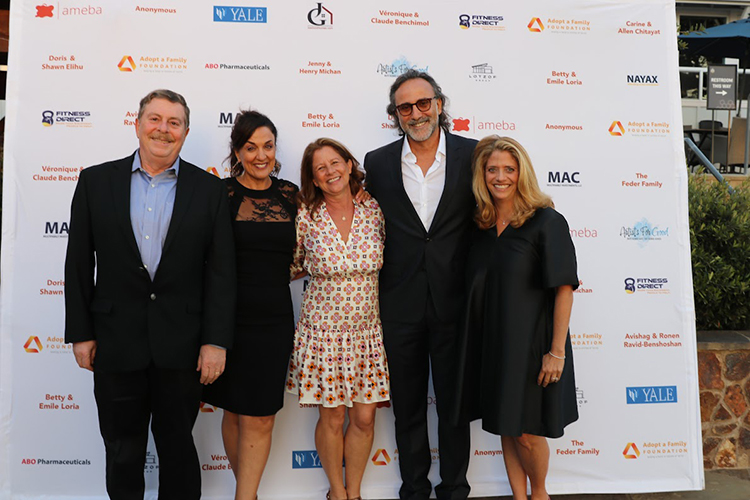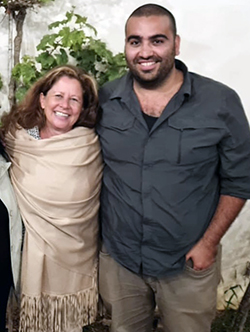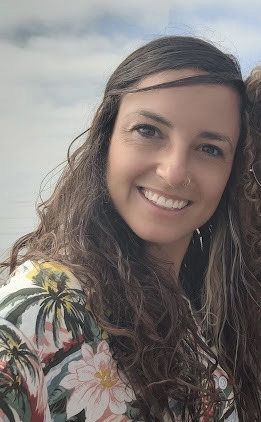
By Donald H. Harrison


ENCINITAS, California – Two Israelis victimized by terror will discuss their processes of recovery on Sunday, Sept. 10, during an Adopt-A-Family Foundation’s gala at the Leichtag Ranch, 441 Saxony Road in Encinitas.
Tamir Abukakis was just 10 years old in 2005 when he and his older sister were walking home from an event sponsored by Bnei Akiva, a Zionist youth movement, when the Red Alert warning sounded. Having no shelter to run to, his sister Ella, then 18, instinctively covered Tamir with her body on the ground.
The rocket explosion killed Ella and wounded Tamir, who still has some shrapnel in his head. Today, Tamir is a married adult. He has been asked to talk about “how he survived and how is his life now,” commented Carine Chitayat, the Swiss-born executive director of the Foundation. “He is a terror victim, but he is also the child of parents who lost a child,” she said. He’ll be asked to address “how he feels about that and how much weight he has on his shoulders.”
Odelia Horgen is the daughter of Esther Horgen, who went for a walk one day in 2020 near her home in Tal Manashe in the northern West Bank and was fatally attacked by a Palestinian, who knocked her to the ground and hit her head and chest multiple times with a heavy stone, according to testimony in the trial in which Muhammad Mruh Kabha was sentenced to life imprisonment.

Odelia will be asked to relate how after her 52-year-old mother was slain, she, as her adult daughter, helped to keep the family together, and “how is that impacting her life,” Chitayat said.
Answers to such questions may help guide the the Adopt-A-Family Foundation as it continues to aid terror victims by sponsoring various kinds of therapy, providing for some of their financial needs; offering interest-free loans to their children to start or improve their businesses; and consulting with them on what kinds of community projects could help make life for terror victims and potential terror victims better.
Abukakis and Horgen represent two of the 20 families that the Foundation has “adopted.”
Chitayat told San Diego Jewish World that Adopt-A-Family has underwritten therapy sessions for Odelia and a sister. Additionally, it sponsored a trip for Esther’s widower, Benjamin, and two sons to visit San Diego “on what we call ‘therapeutic trips.’”
The ten-year-old Foundation tries to annually raise over $100,000 for all-expenses-paid trips to San Diego for families of terror victims; financial gifts to the families at Rosh Hashanah and Passover; various scholarships; summer camps for the children; individual therapy sessions, and such projects as building a playground and a “sensory room” at a school in Sha’ar Hanegev, which neighbors Gaza.
Deeply emotional relationships are developed with the families, who are not simply the recipients of money and love, but who reciprocate the love and emotions that develop when people reach out and commit themselves to each other, Chitayat explained.
“It is definitely very emotional,” she said. “We get very attached to them. It is more than a friendship; it is definitely not just a penpal. It is really impactful, a constantly deep relationship.”
The relationship is not simply one of benefactors and beneficiaries; “the success of our story is that we are at the same level,” Chitayat added. “It is people with people, with the same love and care on both sides. If anything [bad] happens in San Diego, we get a lot of messages.” Similarly, when there is a military confrontation affecting the Israeli communities near Gaza, “we feel for them.”
She pointed out that “20 families” include some 80 individuals – parents, children, and grandchildren.
“We are a small organization, and we are able to answer very quickly their needs,” Chitayat said. “It is very hard to go through the government to get support in Israel – it’s a whole fight – so our work is really important because we take some of the stress away when the trauma needs can be taken care of quickly,” she said.
At the Foundation’s 2022 gala, the speaker was another terror victim, Aya Halevi, of the Or Haner kibbutz in Sha’ar Hanegev, the Israeli partnership region with the Jewish Federation of San Diego.
“Four years ago,” she told last year’s gathering, “our rooftop was damaged by a missile. While the roof and house damages were quickly and properly repaired, the mental and emotional wounds were harder to mend. The kids have a reference point, and every memory from the past years is recollected as before or after the Kassam (missile).”
In a video on the Foundation’s website, Halevi said that when she takes her children to the school bus stop, “I will stay near the bus until it leaves because the worst feeling is to know that you are here at home safe and your kids are on the bus, or waiting for the bus and suddenly there is an alarm, and panic.”
Before a rocket hit their house, “we never really thought it could really hit us,” she added. Now, “I know that any day in time, everything can change in a second. I think sometimes I actually feel like I’m in an action movie or a horror film, not real life. As a mother, I think my responsibility is different than other places. When you have to make sure that everybody is safe and sometimes, they are not next to you, it is really the most terrible feeling because I have to know, I have to control and know, where all my kids are. When I don’t see them and don’t have them around me, it is like the hardest feeling.”
At the upcoming gala, Abukakis and Horgen will tell the story of terror from the point of view of children who are themselves terror victims, or who have suffered the loss of a parent.
Tickets for the Sunday, Sept. 10, event at the Leichtag Foundation cost $180 for general admission and $120 for young adults, 30 and younger. The program will include a silent auction, a kosher dinner under the stars, speeches by Abukakis and Horgen, and entertainment by Israeli-born singer Shanee, whom Chitayat describes as “amazing … a wonderful singer … she comes with all her heart. She is not just hired; she brings emotion to the case and her support.”
*
Donald H. Harrison is editor emeritus of San Diego Jewish World. He may be contacted via donald.harrison@sdjewishworld.com